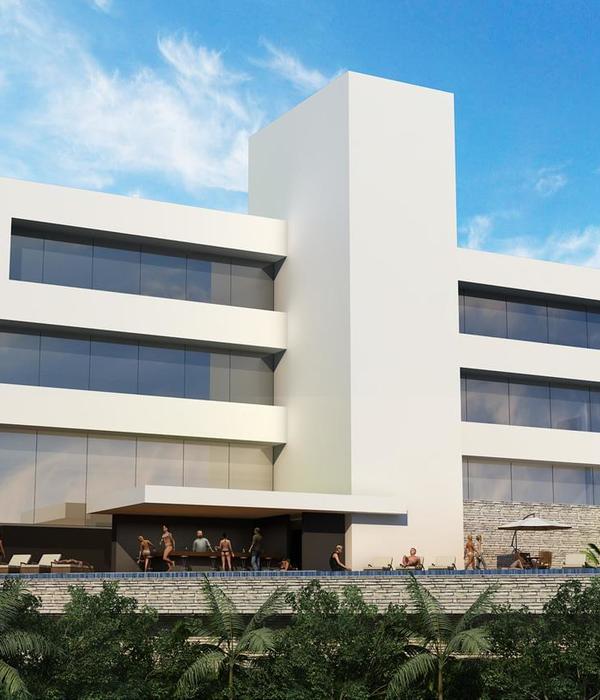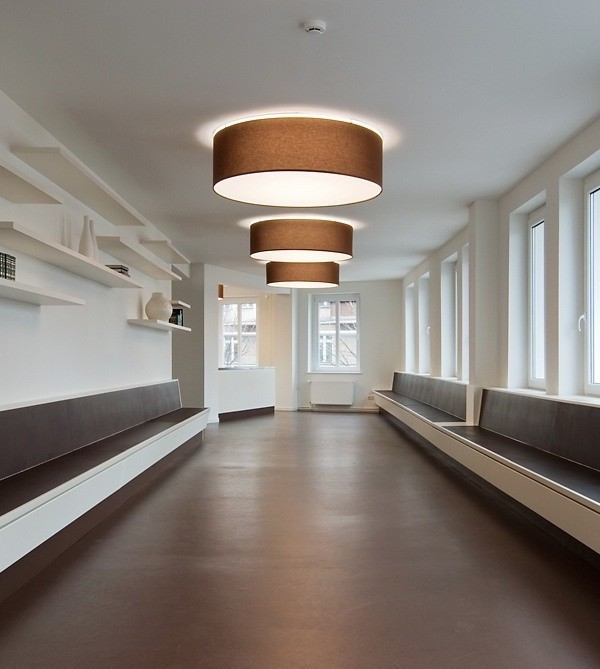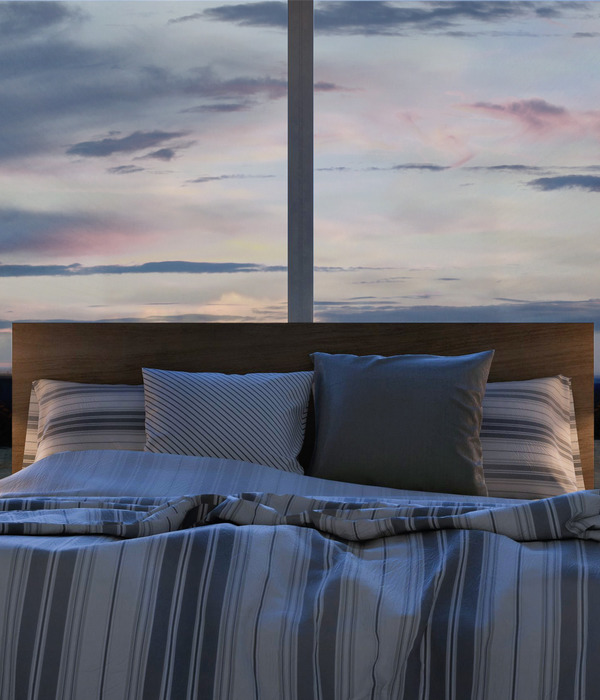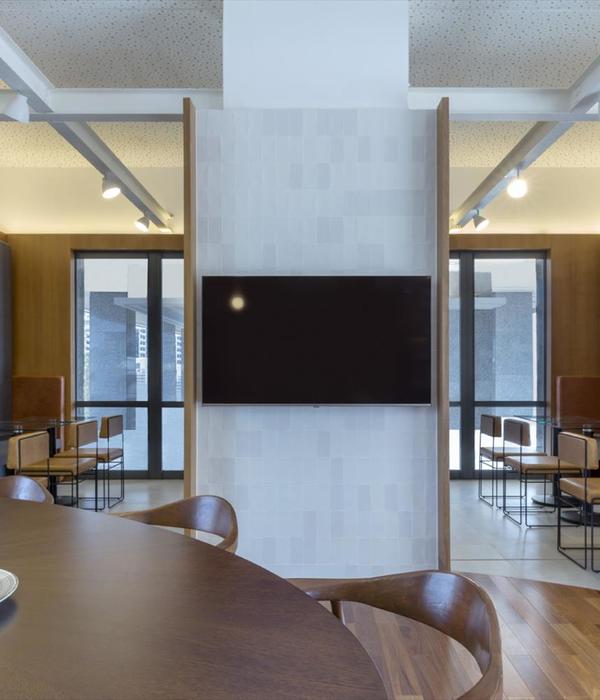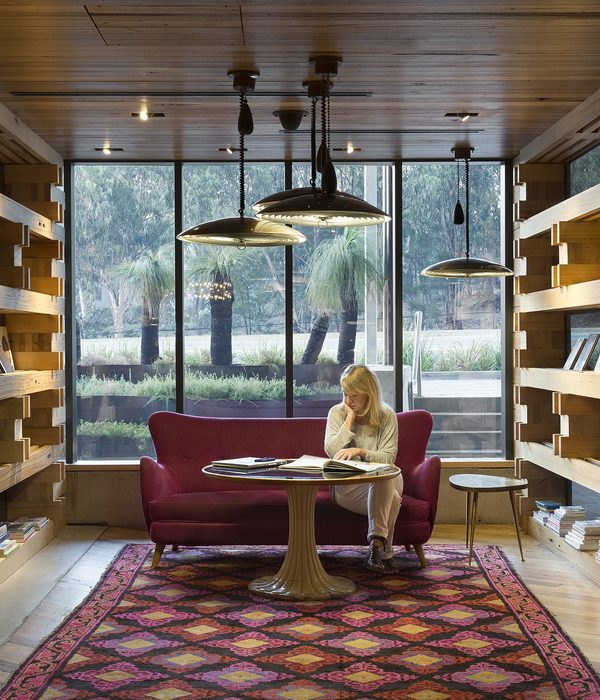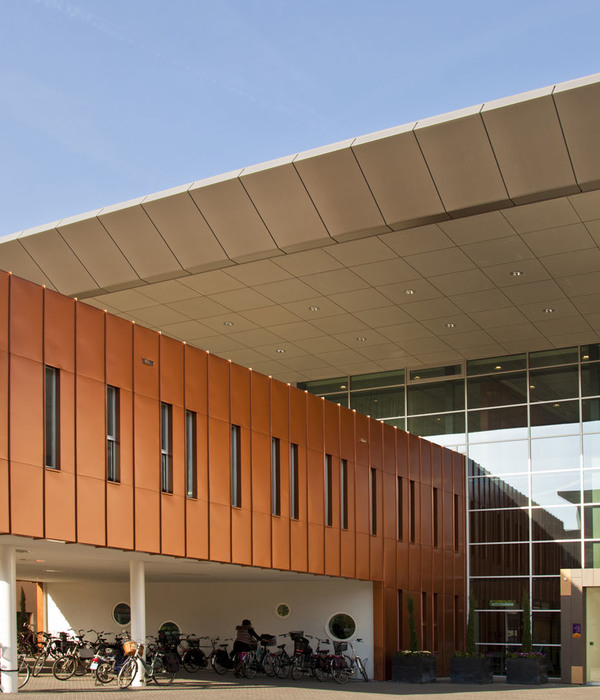感谢
Zaha Hadid Architects
.
Appreciation towards
Zaha Hadid Architects
for providing the following description:
Photo By Luke Hayes
蛇形画廊扩建由扎哈.哈迪德(Zaha Hadid)操刀,在2013年9月28日开幕于伦敦肯辛顿花园。新开的蛇形画廊与原有的画廊相距仅7分钟路程,建筑前身是一座建于1805年的火药库,这里作为蛇形画廊的第二艺术空间,拥有900平方米的面积还有一部分清新透明的外凸自由造型。火药库原有的非历史性隔墙被拆除,拱门被复原,内部设计还有照明设计十分谨慎,以确保不破坏古老的控制氛围,这些古老的空间现在作为展廊的一部分。这次扩建是和蛇形画廊每年举行的大名鼎鼎的其它临时亭项目不同,是一个永久性扩建,这里将同过去一样,继续汇聚来自全世界的艺术还有其它人才。
The Serpentine Sackler Gallery consists of two distinct parts, namely the conversion of a classical 19th century brick structure – The Magazine – and a 21st century tensile structure. The Serpentine Sackler Gallery is thus – after MAXXI in Rome – the second art space where Zaha Hadid Architects have created a synthesis of old and new. The Magazine was designed as a Gunpowder Store in 1805. It comprises two raw brick barrel vaulted spaces (where the gunpowder was stored) and a lower square-shaped surrounding structure with a frontal colonnade. The building continued to be in military use until 1963. Since then Royal Parks used the building for storage. The Magazine thus remained underutilised until now. Over time, much amendment and alteration has occurred inside the historic building and its surroundings.
蛇形画廊扩建,第二艺术空间的餐厅和聚会空间夜景
Instrumental to the transformation into a public art gallery was the decision to reinstate the historic arrangement of the Magazine building as a free standing pavilion within an enclosure, whereby the former courtyards would be covered and become internal exhibition spaces. In order to reveal the original central spaces, all non- historic partition walls within the former gunpowder stores were removed. The flat gauged arches over the entrances were reinstated whilst the historic timber gantry crane was maintained. Necessary services and lighting were discreetly integrated as to not interfere with “as found” quality of the spaces. These vaults are now part of the sequence of gallery spaces.
(上图)餐厅和聚会空间的白色流体造型自由,奔放,独具一格,吸引人。
白色的增建部分作为画廊的餐厅和休憩地,与经过原有的火药库改建的展览空间和谐相处,并与前方的的大庭院开放连接。餐厅自由流体状的白色屋顶就像是云朵,上面有些地方形成向室内拉伸的光井,让自然采光深入内部,墙面是无框的玻璃墙,餐厅家具不是白色的流线形就是透明材质打造的。这里明亮如果同一盏灯。那么的透明,有机,开放,充满活力,现代有趣,是一个与老建筑的形成对比的鲜明建筑。看起来就像是临时的餐厅,其短暂感将被无限延长下去。餐厅与扩建画廊一样,是永久性的建筑。餐厅外面的白色壳体是玻璃纤维编织的纺织膜(具体构造请看文章下方的节点图,外膜是PTFE涂层玻璃纤维布,内膜是有机硅涂层玻璃纤维布,外圈收口为玻璃钢)。
白色壳体是玻璃纤维编织的纺织膜(具体构造请看文章最下方的节点图,外膜是PTFE涂层玻璃纤维布,内膜是有机硅涂层玻璃纤维布,外圈收口为玻璃钢)。墙面是无框的玻璃墙
(上图)面向庭院的餐厅入口
扎哈哈迪德事务所在这个项目上追求强有力的美学,包裹身心的共鸣氛围,以及自然的延伸还有无以伦比的吸引力。她/他们做到了。
The surrounding structure has been clarified and rationalized to become a continuous, open sequence of exhibition spaces looping around the two central powder rooms, thus following the simplicity and clarity of Leo von Klenze’s Glyptothek as an early model for a purpose built gallery.
What was a courtyard before, became an interior top-lit gallery space. Longitudinal roof lights deliver natural daylight into the whole gallery sequence surrounding the central vaults and with a fixed louver system they create perfectly lit exhibition spaces. Retractable blinds allow for a complete black-out of the galleries. The continuous sky-light makes the vertical protrusion of the central core of the building (containing the two vaults) legible on the inside. These reconstructions and conversions were designed in collaboration with heritage specialist Liam O’Connor and in consultation with English
Heritage and Westminster City Council. In addition to the exhibition spaces the restored and converted Magazine also houses the museum shop and offices for the Serpentine’s curatorial team.
原有的火药库被改建成为第二展览空间,内部设计还有照明设计十分谨慎,以确保不破坏古老的控制氛围
火药库原有的非历史性隔墙被拆除,拱门被复原,建筑与餐厅之间被完美的连接,改建后的内部明亮,拥有独特的历史氛围,这里作为展览空间存在
餐厅内部,光井让自然采光深入内部,家具是白色自然流体造型
The extension contains a generous, open social space that we expect to enliven the Serpentine Sackler Gallery as a new cultural and culinary destination. The extension has been designed to complement the calm and solid classical building with a light, transparent, dynamic and distinctly contemporary space of the 21st century. The synthesis of old and new is thus a synthesis of contrasts. The new extension feels ephemeral, like a temporary structure, although it is a fully functional permanent building. It is our first permanent tensile structure and realization of our current research into curvelinear structural surfaces. The tailored, glass-fibre woven textile membrane is an integral part of the building’s loadbearing structure. It stretches between and connects a perimeter ring beam and a set of five interior columns that articulate the roof’s highpoints. Instead of using perimeter columns, the edge beam – a twisted ladder truss supported on three points – dips down to the supporting ground in front, in the back, and on the free west side. On the east side this edge beam (and thus the roof of the extension) swings above the parapet of the Magazine. A linear strip of glazing gives the appearance that the roof is hovering above the Magazine without touching. The Magazine’s western exterior brick wall thus becomes an interior wall within the new extension without losing its original function and beauty. This detail is coherent with the overall character of the extension as a ‘light touch’ intervention.
餐厅内景,这里明亮如果同一盏灯。餐桌和餐椅十分轻透,餐桌的桌面是白色的,桌腿和餐椅都是透明的。透明,有机,开放,充满活力,现代有趣,是一个与老建筑的形成对比的鲜明建筑。
The envelope is completed by a curved, frameless glass wall that cantilevers from the ground to reach the edge beam and fabric roof. The interior of the new extension is a bright, open space with light pouring in from all sides and through the 5 steel columns that open up as light scoops. The anticlastic curvature of the roof animates the space with its sculptural, organic fluidity. The only fixed elements within the space are the kitchen island and a long smooth bar counter that flows along the Magazine’s brick wall. The tables, banquets and chairs are designed as a continuous Voronoi pattern, reminiscent of organic cell structures. Our aim is to create an intense aesthetic experience, an atmosphere that seems to oscillate between being an extension of the delightful beauty of the surrounding nature and of being an alluring invitation into the enigma of contemporary art.
看起来具有临时感的餐厅实际是永久建筑
夜景
夜景
夜景
Architect
Zaha Hadid Architects
Design
Zaha Hadid with Patrik Schumacher
Project Director
Charles Walker
Project Lead (Phase 1)
Thomas Vietzke
Jens Borstelmann
Project Lead (Phase 2)
Fabian Hecker
Project Team
Ceyhun Baskin
Torsten Broeder
David Campos
Suryansh Chandra
Inanc Eray
Matthew Hardcastle
Dillon Lin
Elke Presser
Marina Duran Sancho
Timothy Schreiber
Jianghai Shen
Marcela Spadaro
Anat Stern
Laymon Thaung
Claudia Wulf
Restaurant mise en scene & Gift Shop Melodie Leung
Maha Jutay
Claudia Glas-Dorner
Evgeniya Yatsyuk
Kevin Sheppard
Carine Posner
Maria Leni Popovici
Loulwa Bohsali
Karine Yassine
Steve Blaess
Conservation Architects
Liam O’Connor Architects
Lighting
Isometrix
Structure
ARUP
Services
ARUP
Fire
ARUP
Kitchen
Sefton Horn Winch
Planning Consultants
DP9
Project Management
Rise
Cost Consultants
Gleeds
Contract Administrator
Gleeds
Gross internal area
Total 1566m2
Dimension of Serpentine Sackler Gallery
Height
8.95m from the ground at the building’s highest point
Internal area (usable)
1355m2
Building footprint
1328m2
Maximum ceiling height internally Galleries
3.60m
Stores (2 rooms at front)
2.95m
Powder rooms
7.50m to top of vault,
4.30m to timber beams
Western extension
(social space)
up to 6.00m
Steel used for Social space in total
33t, ca 21t for ring beam, ca 12t for columns
(2.4t per column)
{{item.text_origin}}

